|
Being safe online
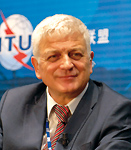 |
|
Dr Plamen Vatchkov |
Dr Plamen Vatchkov, Council Chairman, moderated the session entitled “Be safe online: a call to action”. Nowadays, as the number of children accessing the Internet increases (on social networking sites and elsewhere), more are exposed to inappropriate websites and dangerous situations, he said. A great deal of Internet content is not suitable for children — from sexually explicit material to recipes for making bombs. Risks include becoming the target of harassment, receiving computer viruses, and being hunted by sexual predators. He called for support of ITU’s Child Online Protection (COP) initiative and said it should be adopted by every Member State.
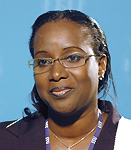 |
|
Diarra Mariam Flantié Diallo |
Diarra Mariam Flantié Diallo, Mali’s Minister of Communication and New Technologies, said “in everyday life, the Internet signifies, first and foremost, greater freedom. Greater freedom for individuals, who connect every day in their millions, across borders. Greater freedom for companies, which can gain access to globalized markets.” However, she added, the Internet can also bring greater threats to security, such as identity theft, child pornography, money laundering and drug trafficking — or even terrorist activities. These threats are hard to overcome in a borderless, virtual world. In 2005, Mali adopted a national strategy on ICT, and it is creating a new legal framework. The European Commission’s Convention on Cybercrime is a useful reference in this work, in Mali and elsewhere. “A global set of laws could be possible, and we need to share good practice on this,” Ms Diallo said. Mali wants to see ITU involved, in order to ensure harmonious international cooperation in the drafting of legal and regulatory texts, the provision of information, and support for the development of human resources, especially lawyers. All such measures would serve to create user confidence in the use of ICT and ensure continued development of the information society. The minister ended by stressing that “as a woman and a mother, I am very aware of the dangers to children, so I am very much in support of the COP initiative by ITU.”
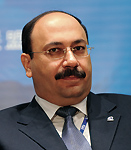 |
|
Dr Sherif Hashem |
Dr Sherif Hashem, Executive Vice President, Info tech Industry Development Agency, Egypt, described ICT in his country. Egypt’s Ministry of Communications and Information Technology (MCIT) was established in 1999 as a focal point for many initiatives. The legal framework includes a Child Protection Law, enacted in 2008. Over two-thirds of Egyptian schools have Internet access, and 25 per cent of Internet users are children. But often, children know more about computers than the older generation, Dr Hashem said, and “many parents do not monitor their children’s use of the Internet at all.” How can we make the online world safer? Dr Hashem said it is essential to raise awareness among parents, teachers, officials, and children themselves, who must be taught to use the Internet safely. Legal and regulatory frameworks are required too. In Egypt, a special law enforcement unit for cybercrime has been created and there are programmes such as the “Cyber Peace Initiative” of the country’s First Lady, Suzanne Mubarak, which raises awareness about safe Internet use. Dr Hashem ended by saying “ITU’s championing of these efforts is critical to our success.”
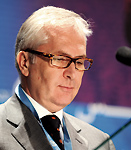 |
|
Dr Pascal Villeneuve |
A message from Executive Director of the United Nations Children’s Fund (UNICEF) Ann Venneman was delivered by Dr Pascal Villeneuve, Associate Director. “Access to information is a human right and a child’s right,” Ms Venneman said. However, threats to a child’s physical and mental integrity seem to be increasing, according to the UN Study on Violence against Children, published in October 2006. Part of the solution to online threats is technical — for example using filtering software — and part relates to raising awareness among children and their care-givers. Ms Venneman mentioned the Third World Congress against Sexual Exploitation of Children and Adolescents, being held in Rio de Janeiro on 25–28 November 2008. “ITU and many other partners are participating in this event,” she noted. UNICEF welcomes ITU’s efforts to strengthen the protection of children in cyberspace, such as through the COP initiative, she concluded. It also encourages the creation of public-private partnerships, which are essential in succeeding in the battle to protect children.
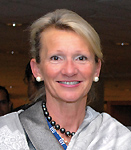 |
|
Deborah Taylor Tate |
Deborah Taylor Tate, Commissioner at the Federal Communications Commission (FCC), United States, said ITU is the “ideal global convenor to discuss these online security issues”. Today there are 100 million websites, with growth in every country including developing ones. “The next generation, the ‘i-generation’, is depending on us to prepare a safe and steady path for them to travel in cyberspace,” said Ms Tate. The Internet is a ubiquitous aspect of children’s lives in industrialized countries. Worldwide law enforcement must cover online child pornography, sexual predators, bullying and trafficking. Many efforts are being made across the world, she said, citing examples of paedophile rings being smashed recently in Spain, Japan and Australia. Ms Tate urged all nations to harmonize their laws on these topics. “Today’s discussion is about educating, preventing, and protecting our children’s precious lives before injury occurs,” she said. ITU, and its COP website, are a “perfect place” for sharing expertise and information. “I share ITU’s goal of increasing safety, decreasing fear and expanding the benefits of ICT in order to build an inclusive information society, particularly for children around the globe — from Timbuktu to Tennessee and beyond.”
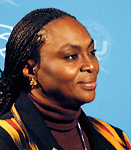 |
|
Dr Christiane Agboton-Johnson |
Dr Christiane Agboton-Johnson, Deputy Executive Director, United Nations Institute for Disarmament Research (UNIDIR), underlined that in addition to having to protect land, maritime and air space, we now have to defend cyberspace. There are few rules in this new domain. “Attacks can be launched from afar, without risk of being injured or killed. While remaining (almost) invisible, fear can be struck in the heart of the enemy camp by targeting individuals or States indiscriminately,” she noted. Beyond international stability and security, she added, cybersecurity is intrinsically linked to the very foundations of human security, and now more than ever, the international community must take action to counter the various threats. It is important to give stakeholders information that enables them to understand and respond to risks. For this reason, UNIDIR held a Disarmament Forum in 2007 on the theme of dangers posed by ICT, including cyberterrorism. Dr Agboton-Johnson also made special reference to the COP initiative of ITU. “Young people are — alas — a target for a host of attacks in various areas, not least pornography and armed violence. Specific programmes must be developed to protect young people, whose minds may be shaped more by what they find on the Internet than by their family members.” Dr Agboton-Johnson concluded by asking whether developments in ICT are creating spaces for freedom, or battlefields that could have devastating consequences.
|
Declaration by the Secretary-General
The High-Level Segment concluded on 13 November with a Declaration by Dr Touré. “Cybersecurity is one of the most important challenges of our time,” he said. “ITU has taken a leading role in promoting cybersecurity and trying to combat the growing tidal wave of cyberthreats,” he added. The Secretary-General went on to stress that “climate change is a global challenge that the world simply cannot afford to lose — not just for our sake, but for the sake of our children.” It is another area in which ITU “can make a real difference,” he said. ITU will continue to join efforts so that the United Nations system can “deliver as one” on this and other important issues. |
|


